What Is a Proof of Concept in Software Development?
A proof of concept in software development is exactly what it sounds like, a way to “prove” that your project can work. In other words, it is like creating a miniature version of your software project to see if it works the way you planned. The whole point of a proof of concept is to see if your software idea can work. It is about showing that your system, app, or product can do what you need it to before you commit to building it.
POC is performed in the early stages of development before spending too much time and resources on a project. This can be seen as an approval in the process of project management, suggesting that you are prepared to go on to the product development stage. With a PoC, you are proving that your idea has a strong foundation before you invest too.
Plus, a successful PoC can help you gain buy-in from stakeholders, investors, or team members by showing that your idea is not just theoretical but practical and achievable.
Why Is a Proof of Concept Important?
Why not just build the whole thing and see how product development goes? May be on your mind. It may seem promising but going straight into the developing phase without validating your idea first is a risky step.
Building software takes time and money, and a PoC helps you avoid expensive mistakes by letting you:
- Technical Feasibility: Can this idea be brought to life with the technology stack that you have chosen?
- Market need: Does your solution solve a real problem, and will users find it useful?
- Secure stakeholder confidence: A PoC can demonstrate to investors or decision-makers that your idea is worth backing.
- Reduces risk: A PoC allows you to identify problems early on and adjust course before you’re too far down the road.
- Saves time and money: Think about putting in months of work, only to find out it doe not work or nobody even wants to use it.
Simply put, a PoC is your way of saying: Let’s test if this idea works before we go all in with our money and time.











